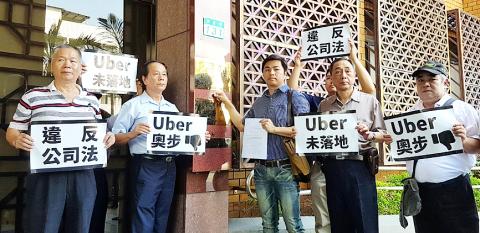Members of a taxi drivers’ union yesterday protested outside the Taipei District Prosecutors’ Office before filing charges against Uber Taiwan general manager Gu Li-kai (顧立楷) for violations of the Company Act (公司法), as controversy continues over how to respond to the ride-hailing app.
“We are here today because the government has disappointed us with its lack of action, and we hope that the courts can provide us and consumers with appropriate guarantees,” Taipei City Professional Drivers’ Union president Cheng Li-chia (鄭力嘉) said.
“The Ministry of Transportation and Communications says they will not allow Uber to continue operating as long as it is illegal, but it has already been four years since the firm’s entrance — what the hell are they doing?” he said, while criticizing the ministry’s plans to loosen taxi regulations to allow for “diversification.”

Photo: Liu Hsin-de, Taipei Times
“They came up with these plans only after Uber’s entrance and have not paid much attention to our voice in discussions,” he said. “What they have repeatedly said is that they want to help us compete with Uber — but how are we supposed to compete with something that is illegal?”
Taxi drivers say that the firm’s operations violate the Highway Act (公路法), adding that tax avoidance and exemptions from insurance requirements give Uber drivers unfair advantages, leading to predatory pricing.
Cheng also condemned reports that the Executive Yuan was considering freezing a possible revocation of Uber’s investment permit by the Investment Commission as it considers legal amendments to facilitate legalization.
“If the license is not revoked before Friday next week, we will act immediately and take to the streets,” he said, adding that some drivers suggested blocking major arteries in protest.
“Our position is that Uber’s current mode of providing services is illegal. We will continue to investigate and fine the firm,” Minister of Transportation and Communications Hochen Tan (賀陳旦) said, denying the ministry’s position had changed.
Investment Commission Executive Secretary Emile Chang (張銘斌) denied that a decision has been made on whether to revoke the firm’s investment permit, saying a decision would be made next week.

Alain Robert, known as the "French Spider-Man," praised Alex Honnold as exceptionally well-prepared after the US climber completed a free solo ascent of Taipei 101 yesterday. Robert said Honnold's ascent of the 508m-tall skyscraper in just more than one-and-a-half hours without using safety ropes or equipment was a remarkable achievement. "This is my life," he said in an interview conducted in French, adding that he liked the feeling of being "on the edge of danger." The 63-year-old Frenchman climbed Taipei 101 using ropes in December 2004, taking about four hours to reach the top. On a one-to-10 scale of difficulty, Robert said Taipei 101

Nipah virus infection is to be officially listed as a category 5 notifiable infectious disease in Taiwan in March, while clinical treatment guidelines are being formulated, the Centers for Disease Control (CDC) said yesterday. With Nipah infections being reported in other countries and considering its relatively high fatality rate, the centers on Jan. 16 announced that it would be listed as a notifiable infectious disease to bolster the nation’s systematic early warning system and increase public awareness, the CDC said. Bangladesh reported four fatal cases last year in separate districts, with three linked to raw date palm sap consumption, CDC Epidemic Intelligence

US climber Alex Honnold left Taiwan this morning a day after completing a free-solo ascent of Taipei 101, a feat that drew cheers from onlookers and gained widespread international attention. Honnold yesterday scaled the 101-story skyscraper without a rope or safety harness. The climb — the highest urban free-solo ascent ever attempted — took just more than 90 minutes and was streamed live on Netflix. It was covered by major international news outlets including CNN, the New York Times, the Guardian and the Wall Street Journal. As Honnold prepared to leave Taiwan today, he attracted a crowd when he and his wife, Sanni,

Taiwanese and US defense groups are collaborating to introduce deployable, semi-autonomous manufacturing systems for drones and components in a boost to the nation’s supply chain resilience. Taiwan’s G-Tech Optroelectronics Corp subsidiary GTOC and the US’ Aerkomm Inc on Friday announced an agreement with fellow US-based Firestorm Lab to adopt the latter’s xCell, a technology featuring 3D printers fitted in 6.1m container units. The systems enable aerial platforms and parts to be produced in high volumes from dispersed nodes capable of rapid redeployment, to minimize the risk of enemy strikes and to meet field requirements, they said. Firestorm chief technology officer Ian Muceus said